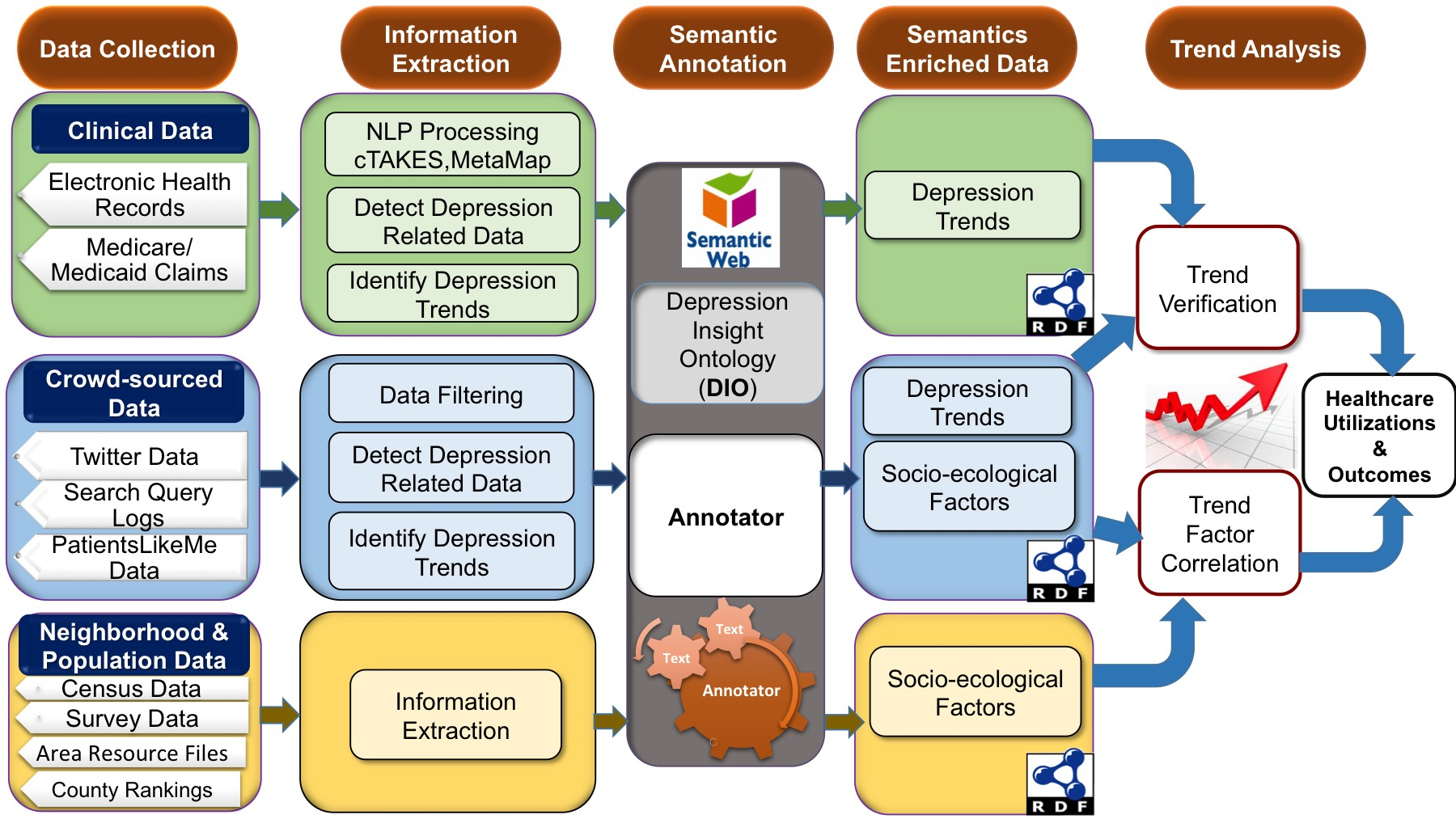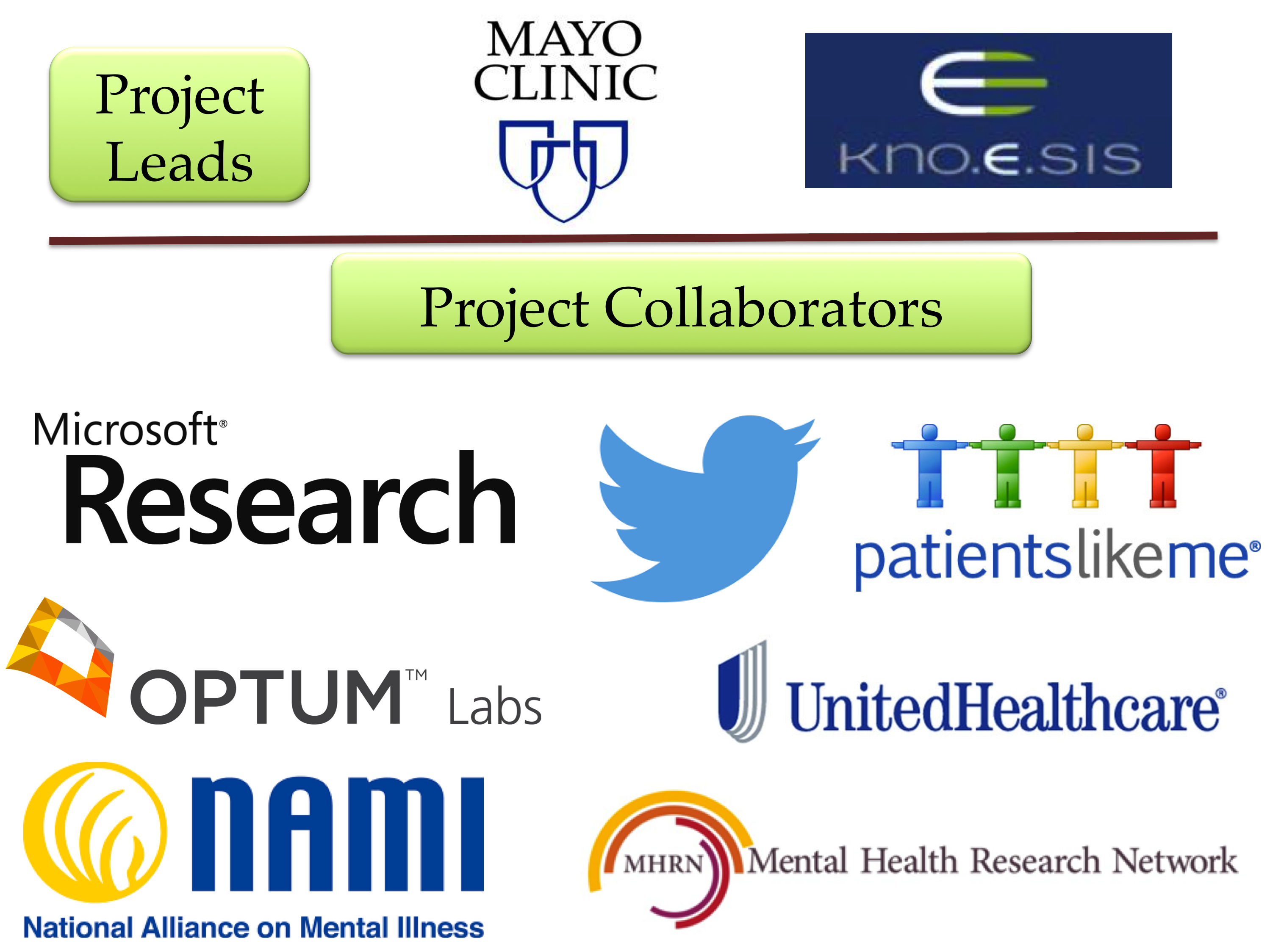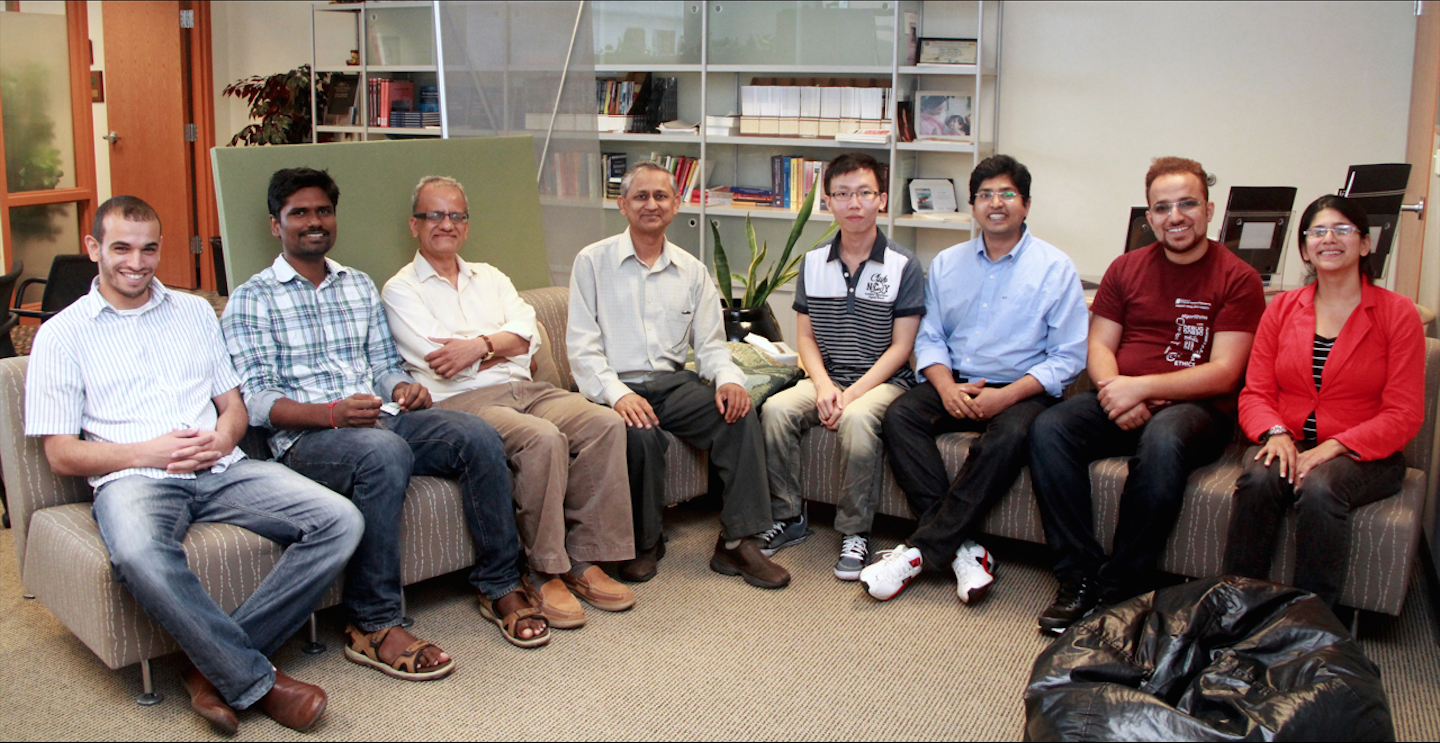Modeling Social Behavior for Healthcare Utilization in Depression
Depression is one of the most common mental disorders in the U.S. and is the leading cause of disability affecting millions of Americans every year. Successful early identification and treatment of depression can lead to many other positive health and behavioral outcomes across the lifespan. This project will apply “big data” techniques and methods for identifying combinations of online socio-behavioral factors and neighborhood environmental conditions that can enable detection of depressive behavior in communities and studying access and utilization of healthcare services.
Contents
[hide]Project Summary
Depression is highly prevalent, both in the US and worldwide. Among US adults, the estimated 12-month and lifetime prevalence rates are 8.3% and 19.2%, respectively. The World Health Organization considers major depressive disorder (MDD) as the third-highest cause of disease burden worldwide, and the highest cause of disease burden in the developed world. However, despite its prevalence and burden, depression remains significantly under-recognized and under-treated in all practice settings, including managed care where less than one third of adults with depression obtain appropriate professional treatment. Denial of illness and stigma are two primary barriers to proper identification and treatment of depression. Many individuals with depression are ashamed to seek out a mental health professional and consider depression a sign of personal weakness. In particular, “self-stigma” has been associated to affect adherence to psychiatric services, hope and quality of life negatively, and also poses as a barrier for social integration. Further, since self-stigma can exist without actual stigma from the public, and is more hidden and inside, it seems to be the worst form of stigma against people with depression and can directly affect the patients’ over all well-being. Studies suggest that early recognition and treatment of depressive behavior and symptoms can improve social function, increase productivity, and decrease absenteeism in the workplace. However, recognition of depression, particularly in early stages, is still challenging.
To address this problem, in this project we plan to develop effective methods for detection of depressive behavior, not only at an individual-level, but also at a community-level. The latter is highly pertinent because depression is significantly influenced by variations in social determinants and socioecological factors. In particular, we will leverage robust and longitudinal electronic health record (EHR) systems at Mayo Clinic and private insurance (UnitedHealthCare/Optum Labs) reimbursement and claims data along with online social media data from Twitter and PatientsLikeMe as well as geo-coded neighborhood and environmental data to develop a “big data” platform for identifying combinations of online socio-behavioral factors and neighborhood environmental conditions to enable innovative ways for detection of depressive behavior within communities and identify patterns and changes in health care utilization for depression across different communities and geographies within U.S.
Updates
-We open source the codes and related depression-indicative terms related to the Semi-Supervised Approach to Monitoring Clinical Depressive Symptoms in Social Media ASONAM paper and symptoms.
-Our paper on Semi-Supervised Approach to Monitoring Clinical Depressive Symptoms in Social Media' is accepted at 2017 IEEE/ACM International Conference on Advances in Social Networks Analysis and Mining [1](ASONAM 2017) held in Sydney, Australia from 31 July - 03 August, 2017.
Our paper on Relatedness-based multi-entity summarization is accepted at IJCAI 2017 (IJCAI) Proceedings of the Twenty-Sixth International Joint Conference on Artificial Intelligence
Funding
|
People
Principal Investigators: Prof. Amit P. Sheth (AIISC, University of South Carolina), Prof. Jyotishman Pathak (Cornell University, Contact PI)
Co-Investigators: Prof. Krishnaprasad Thirunarayan (Kno.e.sis, Wright State University)
Postdoctoral Researchers: Dr. Ugur Kursuncu
Graduate Students: Manas Gaur
Past Members: Kalpa Gunaratna, Ashutosh Jadhav, Amir Hossein Yazdavar, Mohammad Saeid Mahdavinejad , Hussein Al-Olimat, Goonmeet Bajaj, SoonJye Kho
Social Media
Follow us on Twitter
Presentation
Publications
- Shweta Yadav, Joy Prakash Sain, Amit Sheth, Asif Ekbal, Sriparna Saha, and Pushpak Bhattacharyya, "Assessing the Severity of Health States based on Social Media Posts." In 25th International Conference on Pattern Recognition (ICPR2020) - MiCo Milano Congress Center, ITALY 10 - 15 January 2021.
- Gaur, M., Kursuncu, U., Sheth, A. Yadav, S. & Wickramarachchi (2020), "Hypertext 2020 Tutorial: Knowledge-infused Deep Learning", In 31st ACM Conference on Hypertext and Social Media (HT'20), Florida, USA
- Gaur, M., Alambo, A., Sain, J. P., Kursuncu, U., Thirunarayan, K., Kavuluru, R., ... & Pathak, J. (2019, May). "Knowledge-aware assessment of severity of suicide risk for early intervention". In The World Wide Web Conference (pp. 514-525). ACM.
- Yazdavar, A. H., Mahdavinejad, M. S., Bajaj, G., Thirunarayan, K., Pathak, J., & Sheth, A. (2018, June). Mental Health Analysis Via Social Media Data. In 2018 IEEE International Conference on Healthcare Informatics (ICHI) (pp. 459-460). IEEE.
- Deferio, J. J., Levin, T. T., Cukor, J., Banerjee, S., Abdulrahman, R., Sheth, A., ... & Pathak, J. (2018). Using electronic health records to characterize prescription patterns: focus on antidepressants in nonpsychiatric outpatient settings. JAMIA Open.
- Manas Gaur, Ugur Kursuncu, Amanuel Alambo, Amit Sheth, Raminta Daniulaityte, Krishnaprasad Thirunarayan, Jyotishman Pathak. "Let Me Tell You About Your Mental Health!" Contextualized Classification of Reddit Posts to DSM-5 for Web-based Intervention. In The 27th ACM International Conference on Information and Knowledge Management (CIKM’18). Torino, Italy: Association for Computing Machinery; 2018.[2].
- Kho, S. J., Padhee, S., Bajaj, G.,Thirunarayan, K., & Sheth, A. (2019). Domain-specific Use Cases for Knowledge-enabled Social Media Analysis. In Emerging Research Challenges and Opportunities in Computational Social Network Analysis and Mining (pp. 233-246). Springer, Cham.
- Ugur Kursuncu, Manas Gaur,Usha Lokala,Krishnaprasad Thirunarayan,Amit Sheth and I. Budak Arpinar. "Predictive Analysis on Twitter: Techniques and Applications". Book Chapter in "Emerging Research Challenges and Opportunities in Computational Social Network Analysis and Mining", Editor: Nitin Agarwal, Springer, 2018.
- Sanjaya Wijeratne, Amit Sheth, Shreyansh Bhatt, Lakshika Balasuriya, Hussein Al-Olimat, Manas Gaur, Amir Hossein Yazdavar, Krishnaprasad Thirunarayan. "Feature Engineering for Twitter-based Applications", in Feature Engineering for Machine Learning and Data Analytics. Editors. Guozhu Dong and Huan Liu. Chapman and Hall/CRC Data Mining and Knowledge Discovery Series. pp 359-393, March, 2018.
- Amir Hossein Yazdavar, Hussein S Al-Olimat, Monireh Ebrahimi, Goonmeet Bajaj, Tanvi Banerjee, Krishnaprasad Thirunarayan, Jyotishman Pathak, Amit Sheth "Semi-supervised approach to monitoring clinical depressive symptoms in social media" Proceedings of the 2017 IEEE/ACM International Conference on Advances in Social Networks Analysis and Mining 2017
- Wijeratne, S., Sheth, A., Bhatt, S., Balasuriya, L., Al-Olimat, H.S., Gaur, M., Yazdavar, A.H. and Thirunarayan, K., 2017. Feature Engineering for Twitter-based Applications. Feature Engineering for Machine Learning and Data Analytics, p.35.
- Yazdavar, A. H., Al-Olimat, H. S., Banerjee, T., Thirunarayan, K., & Sheth, A. P. (2016). Analyzing clinical depressive symptoms in twitter.
- Sanjaya Wijeratne, Lakshika Balasuriya, Amit Sheth, Derek Doran. EmojiNet: An Open Service and API for Emoji Sense Discovery, In 11th International AAAI Conference on Web and Social Media (ICWSM 2017), pp. 437-446. Montreal, Canada; 2017. Demo | BibTeX
- Amir Hossein Yazdavar, Mohammad Saied Mahdavinejad, Goonmeet Bajaj, Krishnaprasad Thirunarayan, Jyotishman Pathak, Amit Sheth. "Mental Health Analysis Via Social Media Data" 2018 IEEE International Conference on Healthcare Informatics (ICHI)
- Kalpa Gunaratna, Amir Hossein Yazdavar, Krishnaprasad Thirunarayan, Amit Sheth, Gong Cheng. Relatedness-based multi-entity summarization. IJCAI: proceedings of the conference
- Sanjaya Wijeratne, Lakshika Balasuriya, Amit Sheth, Derek Doran, EmojiNet: Building a Machine Readable Sense Inventory for Emoji, In 8th International Conference on Social Informatics (SocInfo 2016), pp. 527-541 Bellevue, WA, USA, 2016.
- Sanjaya Wijeratne, Lakshika Balasuriya, Derek Doran, Amit Sheth. "Word Embeddings to Enhance Twitter Gang Member Profile Identification" In IJCAI Workshop on Semantic Machine Learning (SML 2016). pp. 18-24, New York City, NY: CEUR-WS; 2016.
- Lakshika Balasuriya, Sanjaya Wijeratne, Derek Doran, Amit Sheth. "Finding Street Gang Members on Twitter" In 2016 IEEE/ACM International Conference on Advances in Social Networks Analysis and Mining (ASONAM 2016). pp. 685-692, San Francisco, CA, USA; 2016.
Concurrent Projects
- kHealth: Semantic Multisensory Mobile Approach to Personalized Asthma Care
- Context-Aware Harassment Detection on Social Media (NSF)
- Hazards SEES: Social and Physical Sensing Enabled Decision Support for Disaster Management and Response (NSF)
- Project Safe Neighborhood
- eDrugTrends (NIH)
- Innovative NIDA National Early Warning Sysetm Network (iN3)
- MIDAS
- Market Driven Innovations and Scaling up of Twitris


